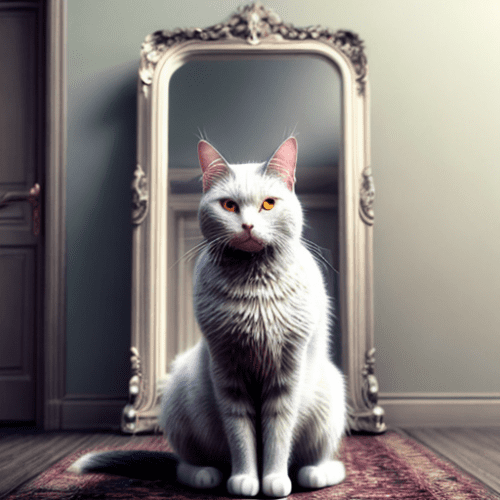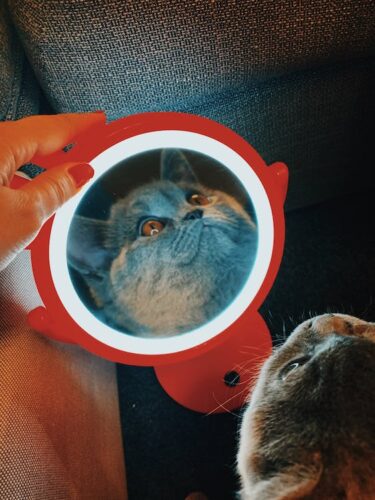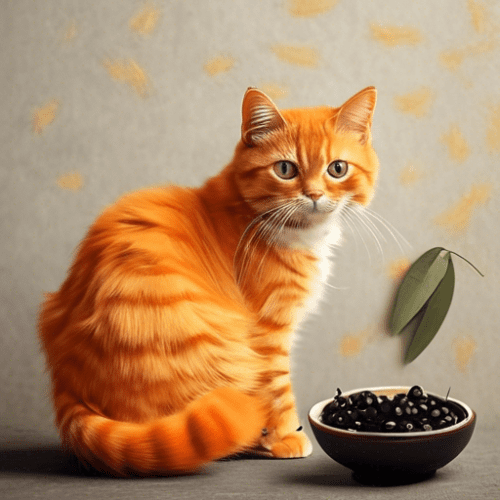You may wonder if your feline friend can recognize their own reflection. While humans and certain animals show self-awareness in mirror tests, cats tend to respond differently. So, do cats recognize themselves in the mirror?
Your cat might treat the image as a mysterious companion or ignore it altogether.
As you observe your cat’s interactions with mirrors, consider how these creatures perceive their environment and what that says about their cognitive abilities.
Table of Contents
Understanding Cat Self-Recognition
You might see your cat eye a mirror and wonder, can they know that’s them? Jackson from Animal Planet says cats like Buster may seem to find another just like themselves. Yet deep down, their wild nature keeps them wary at first.

They have instincts we don’t always get—like staying alert around unknown faces—or reflections. Some critters do grasp mirrors—it’s not just us humans. Think chimpanzees or even some birds; yes, really!
But for pets at home? Keep things safe: no toothpaste or soaps within reach since these are big no-nos if eaten by mistake. Realizing it’s you in the glass isn’t easy—if an animal spots a red mark on its face in the reflection and tries to touch it, now that could show self-recognition.
That idea came about back in 1970 with Gordon Gallup Jr.’s study but imagine—even ants made the list of creatures catching onto this concept! Keep those toilet lids shut tight when you’re sharing space with feline friends—that helps avoid unwanted mishaps!
Cats vs Mirrors: First Encounters
When your cat first sees their reflection, they may act surprised. They look hard at the image, eyes wide and tail twitching. Some might hiss or paw at it softly.
Others sit back to watch this “other” cat in their house more carefully. Your furry friend doesn’t get that mirrors work by bouncing off light from them to show themselves back again; it’s like magic but with science behind it! So when cats meet a mirror for the initial time, don’t expect self-recognition right away—if ever—since recognizing oneself is a complex mental skill not all animals have.
The Mirror Test Explained
When your cat looks in a mirror, she might not get that she’s seeing herself. You see her act out or hiss as if there’s another cat. Yet, it’s more about feeling scared than saying hi to the one in the glass.
Think of how babies don’t know their own face before they turn one; cats are kind of the same way. Science shows animals like dolphins and some apes can spot themselves in mirrors – but not cats or dogs. They use smell—not sight—to pick up who is friend or foe.
So when your pet acts up at her reflection, remember: It’s likely just because something seems new and odd—she doesn’t realize it’s actually her!
Signs of Self-Awareness in Cats
You might notice your cat showing signs of knowing who they’re. Cats, with sharp eyes and keen ears, spot tiny things moving in the dark or hear sounds we can’t. They judge how far away something is with ease that is a key part to catching their prey just right every time.
A steady sense of balance helps them leaping onto a thin fence smoothly! This isn’t self-awareness like some animals show, but these skills hint at smart minds that learn from what’s around them. While cats may not pass classic mirror tests like dolphins do, they’re sure aware in their own ways.
Common Reactions to Reflections

When your cat sees their image, they might act odd. They may hiss or paw at the mirror, thinking it’s another cat. This shows their instinct to defend what they think is theirs.
Remember how mirrors began? Those old stone ones were not clear like today’s glass that reflects well. Cats now see a sharp other “cat,” leading them to react as if it was real – but with some confusion for sure.
What does this tell us? Our furry friends likely don’t get the whole mirror idea yet; these actions are just natural responses to what seems like an unknown feline in their space!
Animal Cognition and Self-Identity
Think about how some animals know themselves in a mirror. It’s tough for many creatures to get this skill. Animals face mirrors to test self-recognition.
They look for a mark visible only in reflections, suggesting “that’s me!” awareness. However, remember, not all minds are the same. Some smart beings like apes and dolphins do pass these tests; they go “Hey!
What’s this on me?” using the mirror as help. This suggests their brains grasp complex ideas of who they’re, which is special among living things. But remember too – just because an animal doesn’t ace a mirror test doesn’t mean it’sn’t aware or clever in its way.
Some argue seeing isn’t everything; other senses may play bigger parts across different species’ lives when recognizing “self.” So while tests with mirrors give us cool insights into animal smarts, there could be more to learn outside such experiments.
Comparing Cat Responses to Other Species
Cats don’t get that the kitty in the mirror is them. They use smell, not sight, to know who’s who. So when your cat seems to fight their reflection, they’re just trying out this odd ‘other’ without a scent.
Sometimes though, it might be for some love from you! Each time they swipe at mirrors and you rush over? They remember – act wild; get cuddles or treats!
Our furry pals aren’t really checking themselves out – it’s more about facing an unknown visitor that doesn’t make sense in their world of scents. Interesting how such creatures think so differently than we do!
Debating the Concept of Mirror Recognition
Mirror recognition sparks much debate. Picture this: a cleaner wrasse gazes at its reflection, acting strangely—researchers think it shows self-recognition. Imagine the fish passing what’s called “the mark test,” proving some animals realize their mirrored image is themselves.
This isn’t just about recognizing shapes or colors; it’s deeper. What happens when these creatures first see themselves? Often, they may treat reflections as others of their kind or peer behind to find who’s there!
Over time, they change tactics. They’ll try odd things like twisting and turning before that “aha!” moment hits. You spotted an odd spot on your face in the mirror one day.
You knew the figure with the smudge is actually ‘you,’ so you reached to touch it. You’ve passed a version of this famous cognition test!
Now get why scientists are intrigued by which beings can or cannot grasp mirrors’ truth? It uncovers layers about how various minds perceive reality itself.
Scientific Studies on Felines and Mirrors
In studies, cats often see their mirror image as another cat. This sparks interest or might cause a spat. They show us toys to share love and trust, much like they would in the wild with their hunt’s result.

Kneading is a leftover kitten habit for comfort; it also makes that spot seem more “theirs” by scent marks left behind. Remember each cat is special—watch them play or rest! And if you need someone to care for your unique pet while away, find a sitter who will cherish every little trait and keep you updated on their antics every day.
Enhancing Environmental Enrichment with Mirrors
When you place a mirror in your cat’s space, it might stir up different reactions. Some cats get curious; they may not recognize themselves but will investigate what seems like another feline. Others act unfazed and keep to themselves, while some show fear or aggression towards their own image.
If your furry friend is stressed by the reflection, try moving the mirror away or cover it. Cats with jitters could benefit from products like FELIWAY Optimum that calm them down. Remember: they see things differently than we do!
They rely more on touch and smell rather than color recognition—blue and green are clearer for them compared to other colors.
Beyond the Looking Glass: Complex Behaviors
In the mirror test, only a few animals like apes and dolphins show they know it’s them in the glass. They look at marks on their bodies that were put there when they slept. If they try to touch or find this mark after seeing themselves, we think: “Ah!
It knows itself!” But remember, not all smart behavior is caught by this one test. Some can tell themselves apart from others through sound or smell – ways beyond our human tests. Think of Jenny, Darwin’s observed orangutan who could have known her own face shown back at her.
Chimps act out first but then start using mirrors for tasks like grooming areas unseen without help from reflections—showing deep understanding hidden beneath simple acts. So while you watch your cat eye its reflection with cool curiosity—or ignore it outright—ponder more than just sight recognition: consider their world rich with other senses defining self-awareness far off what humans gauge as knowing oneself.
Final Say: do cats recognize themselves in the mirror
Cats may not recognize themselves in mirrors as humans do. Their reactions suggest they see another cat, not their own reflection. While some feline behavior might hint at self-awareness, conclusive evidence remains elusive.
Cats typically rely more on scent than sight for identification; thus, the mirror image lacks the familiar personal scent cue, leading to possible confusion or disinterest. For now, understanding cats’ perceptions of their mirrored images continues to intrigue scientists and pet owners alike while definitive answers remain just out of reach.

